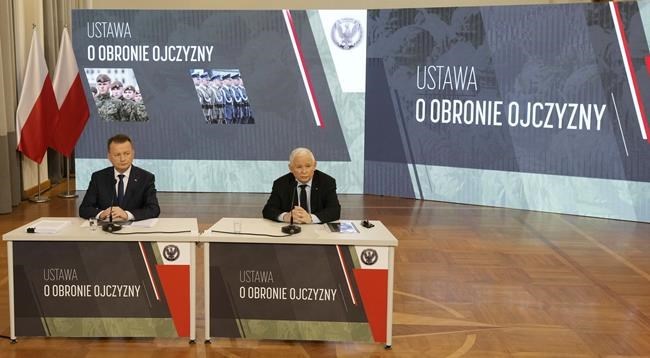
Jaroslaw Kaczynski,right, the head of Poland's Jaroslaw Kaczynski, the head of Poland's ruling party Law and Justice, and Defense Minister Mariusz Blaszczak speak at a news conference in Warsaw, Poland, on Tuesday Oct. 26, 2021. Kaczynski and Blaszczak presented plans Tuesday for a bill to "defend the fatherland," legislation aimed at strengthening the military as the country faces migration pressure from its eastern neighbor Belarus. (AP Photo/Czarek Sokolowski)
Republished October 26, 2021 - 11:36 AM
Original Publication Date October 26, 2021 - 5:46 AM
WARSAW, Poland (AP) — Poland's ruling party leader presented plans Tuesday for a homeland defense bill which he said is aimed at “radically” strengthening the military as the country faces migration pressure from its eastern neighbor Belarus.
Jaroslaw Kaczynski, the deputy prime minister who is undisputedly the most powerful politician in Poland, said the bill is needed due to a deteriorating international situation and also to Poland's geopolitical location. Examples he gave included neighboring “Russia's imperial ambitions” and the hybrid warfare being waged by Belarus against Poland and other European Union nations using migrants.
"If we want to avoid the worst, that is war, we have to act according to the old rule: ‘If you want peace, prepare for war,’” Kaczynski said at a news conference in Warsaw.
He argued that, as a country which lies on the eastern flank of the European Union and NATO, Poland must have a serious deterrent force and the “ability to effectively defend itself for a long time on its own.”
He noted NATO decisions take time to implement.
The bill, which still needs approval from parliament and the president, is aimed at replacing an existing one from 1967. At that time Poland was a member of Warsaw Pact eastern military alliance, under Moscow's control. Since 1999 it has been a member of NATO, and is regularly cited as one of the few alliance members that invest at least 2% of its GDP in defense.
Kaczynski said, speaking alongside Defense Minister Mariusz Blaszczak, that he believed the changes would also benefit NATO.
Kaczynski and Blaszczak presented a plan to increase the defense budget and to more than double the size of the military to at least 250,000 soldiers and 50,000 reserves. The changes do not involve a reinstatement of compulsory military service.
Kaczynski also said Poland hopes to strengthen its forces by buying U.S.-produced military equipment but would also look at European-made weapons.
Some opposition lawmakers criticized the plans, noting that they come from the ruling Law and Justice party, which they said repeatedly has weakened the military.
“It doesn’t look good,” said Cezary Tomczyk, a lawmaker with the centrist Civic Platform party. “Who purged the army of generals, colonels and majors? Who stopped the modernization of the Polish army?”
The plan to strengthen the army comes as Poland faces heavy migration pressure from Belarus. Warsaw accuses the Belarusian regime of President Alexander Lukashenko of encouraging migrants from the Mideast, Africa and elsewhere to seek entry to the EU through Poland.
It also comes as Poland finds itself increasingly at odds with its EU partners, with a conflict over changes to Polish courts — which the EU sees as an attack on judicial independence — escalating this month. Prime Minister Mateusz Morawiecki told the Financial Times in comments published Monday that if the EU withholds funds to Poland over rule of law issues, it would be like starting World War III.
In a separate political development, Morawiecki announced changes to his Cabinet on Tuesday, among them new appointees to head the climate ministry, the agriculture ministry and the ministry of technology and development. Some observers said the changes involve the departures of some Morawiecki allies.
Poland has reacted to the migrant crisis by declaring a state of emergency along the border with Belarus. It has also been fortifying the border with razor wire and has deployed soldiers to help border guards. The government also plans to construct a high permanent barrier with motion sensors.
Polish border guards have also been pushing migrants back across the border, including some families with children. A new Polish law took effect Tuesday that legalizes the pushbacks.
Human rights officials have criticized Poland's state of emergency while the UN refugee agency has said that the new legislation “undermines the fundamental right to seek asylum."
___
Follow all AP stories about global migration at https://apnews.com/hub/migration.
News from © The Associated Press, 2021